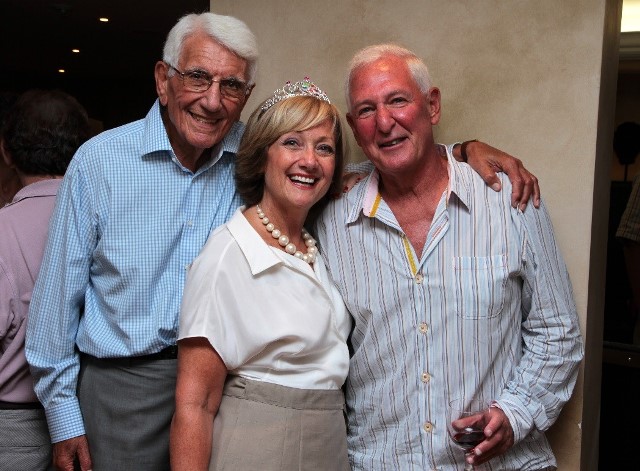Pop icon Madonna released her 13th album, Rebel Heart, in March 2015. The album’s tour currently has her travelling across the globe to perform 87 shows before the year is over. This August, Madonna celebrates her 57th birthday.
English actor Helen Mirren won an Academy Award for Best Actress for her performance in The Queen in 2007. Since winning her Oscar, she has appeared in almost 30 movies, plays and television shows. Mirren turns 70 years of age this summer.
Hershel McGriff is the oldest driver to win and/or race NASCAR. Racing for 35 seasons, he was 84 when he suited up for his final race in June 2012 at Sonoma Raceway. Now 88 years old, McGriff is one of five drivers inducted into NASCAR Hall of Fame Class of 2016.
Do your current perceptions of #seniors match the people I describe above? If they do not, it is time for a shift.
Think about it: how would you describe a senior? Would you use the characteristics frail, in-active, vision or hearing impaired, goes to bed early, stays at home…? What about the word old?
Do these characteristics fit the profiles of people in your life – your parents, grandparents, friends and co-workers? If you are over 50 years of age, do they apply to you? My guess is probably not.
MORE: ONTARIO GERIATRICS LEARNING CENTRE
In my view, the term “senior” is incorrectly used to represent one homogeneous group. The reality is the #new senior: a demographically complex cohort with interests and needs that vary as they age.
5.7 Million adults – 16 per cent of Canada’s population – are over the age of 65. There are more people who are 65 years of age and older, than people under 15 years of age.
Although alarming, these facts are not news. The story is not how many older people there are, but who they are and how they are defining aging.
The new senior is a combination of three different sectors: Boomers (born between the years 1946 and 1965); Active older adults (born between 1930 and 1945) and seniors (born before 1930).
According to David Cravit in his book, The New Old, seniors can be grouped into “those who are aging” and “those who are old”.
The views and needs between these groups are very different.
MORE: DEPRESSION IN THE ELDERLY: WHERE’S THE EVIDENCE?
“Those who are aging” includes many who are:
- Working longer
- Caregivers and supporters for parents, adult children and grandchildren
- Embracing new experiences including travelling, keeping fit and active
- Worrying their money will run out
- Embracing new technologies and ways of doing things
“Those who are old” share characteristics that may be surprising to some. Though they may have aging-related health conditions many are:
- Choosing to live in their own home for as long as possible
- Driving their own cars
- Going out to shop, for doctors’ appointments and to see movies
- Having new romantic relationships
The new senior is my reality, both personally and professionally. My husband and I are Boomers who recently visited London to see our daughter and to BC to visit our son; we work full-time; and we play tennis three times a week. We also spend time with my father who is an active 91 year old.
I believe this story, and the realization that not everyone over 50 years of age is a “senior”, presents a pivotal moment in how hospitals and the health care sector choose to prepare for Canada’s fastest growing demographic.
From porters to nurses, lab technicians to physiotherapists, everyone plays a role in the patient experience.
Meaningful patient engagement leads to a better patient experience. The first step is to understand who you are engaging with.
In January 2015, Mount Sinai Hospital, Bridgepoint and Circle of Care joined together to form the Sinai Health System. This system enables patients to move seamlessly across different care settings. With the combination of strengths from each organization, patients have access to a better, more coordinated continuum of care: from acute care, through to rehabilitation, complex care, primary and community-based care.
In October 2015, Humber River Regional Hospital (HRRH) opened its doors and with it came new ideas about geriatric care. In HRRH’s emergency department, dedicated Geriatric Emergency Management (GEM) nurses deal exclusively with senior patients in the ER, providing vital care and helping facilitate older patients’ care needs. A multi-disciplinary approach to care with a blend of medical expertise and emotional support. HRRH also has a Geriatric Out-Patient Clinic that ensures discharged patients can return to get the care they need in a familiar setting.
Several companies are also embracing the new senior, with highly targeted thinking and innovation.
Healthwick is an online medical supply store that sells direct-to-home adult diapers and incontinence products to those who may not be physically able to go to the store (as well as those who may not want to) to buy these products.
DementiaHack is a project supported by Facebook, the British, Canadian and Ontario governments that aims to help dementia sufferers and their caregivers by identifying “real-time immediate and tangible products and services and turbo-charging them to market”.
It is time we collectively work to shift our thinking and view the new senior as an emerging and growing market sector. These new demographics can help us effectively plan to meet their highly targeted needs.
It’s time we all make an effort to keep up with the new senior.




